
A Guide to Tooth Pain: Relief From Tooth Pain, and More
There’s no denying it: tooth pain is uncomfortable and frustrating, and it can severely impact your ability to get on with your day. If you’re suffering with a toothache, it’s important to know the root cause so you can get relief for tooth pain as soon as possible.
Learn more about the common causes and symptoms of tooth pain, as well as some treatment options that can help give you relief from tooth pain, with our guide below.
TOOTH PAIN CAUSES – WHY DO MY TEETH HURT?
Toothache can be the result of many different issues, so the type, location and severity of your pain will depend on what’s causing it. For example, your tooth pain may feel ‘sharp’ and only come on sometimes, or it may feel ‘dull’ and constant throughout the day. Ultimately, tooth pain can be the result of anything that causes the innermost layer of your tooth (dental pulp) to become inflamed.1
The best person to diagnose the source of your tooth pain is your dentist, so you should arrange a dental appointment if your teeth are causing you discomfort. However, it’s likely that your tooth pain is due to one of these common causes:1,2
- Tooth decay – decay can lead to cavities (holes) forming in your teeth and cause tooth sensitivity and pain, particularly when you consume hot or cold food and drinks.3
- A cracked or damaged tooth – these cracks are often too small to be seen with the naked eye, but that doesn’t stop them from causing tooth pain.
- A loose or broken filling – issues with dental work like fillings can often bring on tooth pain.
- Receding gums – if your gums recede (shrink back), they can expose the more sensitive parts of your tooth root. Receding gums is a common symptom of advanced gum disease (periodontitis).4
- Issues with your braces – broken or damaged braces can also be a cause of tooth pain, and should be repaired by your dentist or orthodontist as soon as possible.
- Tooth infection – an infection often develops as a result of a tooth (or wisdom tooth) only partially breaking through your gums. Learn more about tooth and wisdom tooth infection symptoms below.
TOOTH INFECTION SYMPTOMS
If you have a tooth infection, it’s likely that you will develop a dental abscess – a collection of pus that forms inside the teeth, gums or in the bone that holds the teeth in place. These unpleasant abscesses are often painful and don’t go away on their own, so it’s important to seek treatment from a dentist as soon as possible.5
Symptoms of an abscess may include:5
- Intense, throbbing pain in the affected tooth or gum that may come on suddenly and get gradually worse.
- Pain that spreads to your ear, jaw and neck on the same side as the affected tooth or gum.
- Pain that's worse when lying down, which may disturb your sleep.
- Redness and swelling in your face.
- A tender, discoloured or loose tooth.
- Shiny, red and swollen gums.
- Sensitivity to hot or cold food and drink.
- Bad breath or an unpleasant taste in your mouth.
In addition to tooth pain, wisdom tooth infection symptoms may include:6
- Red, inflamed gum near the wisdom tooth.
- Pus coming from the gum.
- Swollen and sore lymph nodes underneath the jaw.
- Difficulty opening the mouth and swallowing.
- Fever.
- Bad breath.

HOW TO GET RELIEF FROM TOOTH PAIN
The good news is that there are many treatment options that can help provide relief for tooth pain.
If your tooth pain persists for more than two days, make an appointment with your dentist so that they can diagnose the cause of your pain and recommend the right treatment.2 Depending on the cause of your tooth pain, your dentist may recommend the following:
- Pain relief medicines – over-the-counter medications like paracetamol or ibuprofen can help give you relief from tooth pain and inflammation. Speak to a pharmacist about whether these may be right for you.2
- Salt water rinse – rinsing your mouth with salt water may provide relief, but this is not appropriate for children.2
- Swap to a specialist sensitive teeth toothpaste – if your pain is a result of sensitive teeth, try switching to a toothpaste specially formulated to care for sensitive teeth, like Sensodyne. Learn more about treating tooth sensitivity pain.
- Watch what you eat – stick to soft foods, like yoghurt or scrambled eggs, and try to avoid chewing with the sore tooth. Try to avoid foods that are particularly hot, cold or sweet.2
- Don’t smoke – smoking can irritate and worsen some tooth pain.2
- Antibiotics – you may be prescribed antibiotics for a tooth or wisdom tooth infection if it is particularly severe.5,6
- Root canal – if you have developed a dental abscess, root canal treatment may be used to remove the abscess from an affected tooth before filling and sealing it.5
- Tooth extraction – in rare cases where a tooth infection is severe, the affected tooth may need to be removed.5
Remember that your GP is not able to provide dental treatment, so your dentist is the best person to consult for tooth pain issues.2
Go to A&E and seek emergency care if you have toothache and:2
- the area around your eye or your neck is swollen
- swelling in your mouth or neck is making it difficult for you to breathe, swallow or speak
Sources: Clicking any of the links below takes you to an external website that is independently operated and not managed by Haleon. Haleon assumes no responsibility for the content on the website. If you do not wish to leave this website, do not click on the links below.
- Toothache. nidirect. https://www.nidirect.gov.uk/conditions/toothache. Accessed 12/08/20.
- Toothache. NHS. https://www.nhs.uk/conditions/toothache/. Accessed 12/08/20.
- Sensitive Teeth. American Dental Association. https://www.ada.org/~/media/ADA/Science%20and%20Research/Files/patient_33.pdf. Accessed 12/08/20.
- Gum disease. NHS. https://www.nhs.uk/conditions/gum-disease/. Accessed 12/08/20.
- Dental abscess. NHS. https://www.nhs.uk/conditions/dental-abscess/. Accessed 12/08/20.
- Wisdom teeth. Better Health Channel, Victoria State Government, Australia. https://www.betterhealth.vic.gov.au/health/conditionsandtreatments/wisdom-teeth. Accessed 12/08/20.








